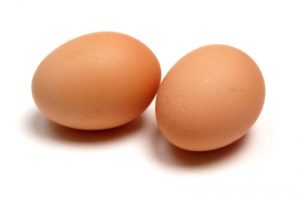 A few weeks ago I posted research about the nutrient choline and discussed its importance for brain health. Now Dr. Emma Derbyshire in the United Kingdom has written a piece in the current issue of the journal BMJ Nutrition, Prevention & Health about the necessity of choline in the diet and the health dangers of this nutrient being neglected, especially in people following plant based or vegan diets.
A few weeks ago I posted research about the nutrient choline and discussed its importance for brain health. Now Dr. Emma Derbyshire in the United Kingdom has written a piece in the current issue of the journal BMJ Nutrition, Prevention & Health about the necessity of choline in the diet and the health dangers of this nutrient being neglected, especially in people following plant based or vegan diets.
Choline is an essential nutrient that cannot be produced by the body in amounts needed for human requirements. Good sources of choline are meat, dairy products, poultry, and eggs, and it appears that eggs (the egg yolks) are especially beneficial.
From Medical Xpress: Suggested move to plant-based diets risks worsening brain health nutrient deficiency
The momentum behind a move to plant-based and vegan diets for the good of the planet is commendable, but risks worsening an already low intake of an essential nutrient involved in brain health, warns a nutritionist in the online journal BMJ Nutrition, Prevention & Health.
To make matters worse, the UK government has failed to recommend or monitor dietary levels of this nutrient—choline—found predominantly in animal foods, says Dr. Emma Derbyshire, of Nutritional Insight, a consultancy specialising in nutrition and biomedical science.
Choline is an essential dietary nutrient, but the amount produced by the liver is not enough to meet the requirements of the human body.
Choline is critical to brain health, particularly during fetal development. It also influences liver function, with shortfalls linked to irregularities in blood fat metabolism as well as excess free radical cellular damage, writes Dr. Derbyshire.
The primary sources of dietary choline are found in beef, eggs, dairy products, fish, and chicken, with much lower levels found in nuts, beans, and cruciferous vegetables, such as broccoli.
In 1998, recognising the importance of choline, the US Institute of Medicine recommended minimum daily intakes. These range from 425 mg/day for women to 550 mg/day for men, and 450 mg/day and 550 mg/day for pregnant and breastfeeding women, respectively, because of the critical role the nutrient has in fetal development.
In 2016, the European Food Safety Authority published similar daily requirements. Yet national dietary surveys in North America, Australia, and Europe show that habitual choline intake, on average, falls short of these recommendations.
"This is....concerning given that current trends appear to be towards meat reduction and plant-based diets," says Dr. Derbyshire. She commends the first report (EAT-Lancet) to compile a healthy food plan based on promoting environmental sustainability, but suggests that the restricted intakes of whole milk, eggs and animal protein it recommends could affect choline intake.
"If choline is not obtained in the levels needed from dietary sources per se then supplementation strategies will be required, especially in relation to key stages of the life cycle, such as pregnancy, when choline intakes are critical to infant development," she concludes.
